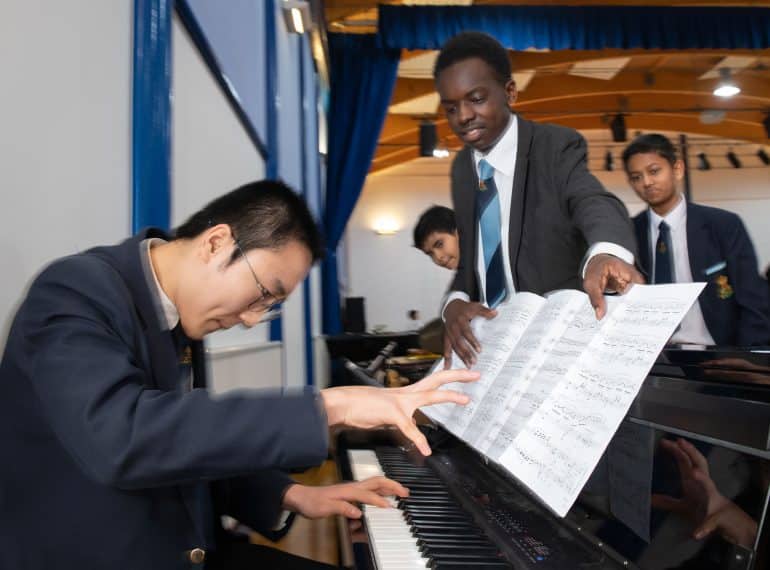
Scores of the School’s young musicians battle it out today in a competitive Pianoathon Challenge being held to raise money to buy pianos for the new Music School.
Each of the School’s Houses has been challenged to provide an hour of sound, with small teams of musicians and soloists playing for up to three minutes each: the result should be six hours of non-stop music in the Main School Hall.
The event has been arranged as one of the special events taking place to celebrate tomorrow’s Founder’s Day.
Director of Music Ruth Partington said: “This is part of our last big push to ensure that our brilliant new Music School is equipped to the highest standards when it opens in the autumn. Thanks to the generosity of the School’s Foundation Trustees, we have already secured the purchase of a superb grand piano for our new recital hall, but that still leaves seven new practice rooms all needing a high-quality piano – and that is what we are raising money for today.
“If you haven’t already donated, please give now, sponsoring your House, or your son’s House, via our dedicated eQE Pianoathon page. This is a real first for QE and promises to be a thrilling event: let the playing commence!”
Parents and friends can watch the musical action unfold live in a special YouTube broadcast (above), which can also be viewed on the eQE page and via the Music department’s YouTube page.
Each House has entered small teams comprising up to five musicians – including at least one pianist – to play music of their choice. There is a visiting guest adjudicator, Mr Huw Jones, Director of Music at The John Lyon School in Harrow, who will be helping to pick the winners in the various categories, which cover team and solo performances (both for each year group and overall), also including a prize for the Best House Overall. Houses that raise large amounts of money will also have the opportunity to have one of the new pianos named after them.
Today’s musical menu chosen by the boys includes a rich range of genres and styles, and features instruments ranging from violins to electric guitars, and from oboes to tablas. Here is a small selection of the repertoire to be heard, House by House:
- Broughton: Canon in D, Pachelbel; Étude op 10 no. 12 ‘Revolutionary’, Chopin; Peppa Pig theme
- Harrisons’: Es war einmal, Grieg; Downton Abbey theme, John Lunn; Samba Nights, Proudler
- Leicester: Attack on Titan Opening Theme 1, Sawato; Merry Christmas, Mr Lawrence, arr. Sakamoto; I See Fire, Ed Sheeran
- Pearce: Sonatina in C major, Kuhlau; Opening Night Jazz, Martha Mier; Sonata No. 3, Prokofiev
- Stapylton: Romanze Op. 28, Schumann; Sonatina Movement 1, Dušek; Toccata in G minor
- Underne: Pink Lady, Pam Wedgwood; Prelude in C-sharp minor, Rachmaninoff; Your Song, Elton John.
The £3.5m-plus Music School, which is currently in the final stages of construction, received the go-ahead in 2019 after the Department for Education accepted the School’s £2.2m bid, which consisted of a £1.2m grant and £1m loan.
Like all major improvements at the School over the past two decades, the project is relying on the generous financial support of the Friends of Queen Elizabeth’s and other benefactors. Pride of place in the building will go to the Yamaha CF6 grand piano in the recital hall, which was chosen by the Music Department after a week-long audition process. Valued at just under £75,000, it is being paid for by the School’s Foundation Trustees.
For those without an eQE account, donations can be made to each House’s total by clicking on the relevant name: Broughton; Harrisons’; Leicester; Pearce; Stapylton; and Underne.

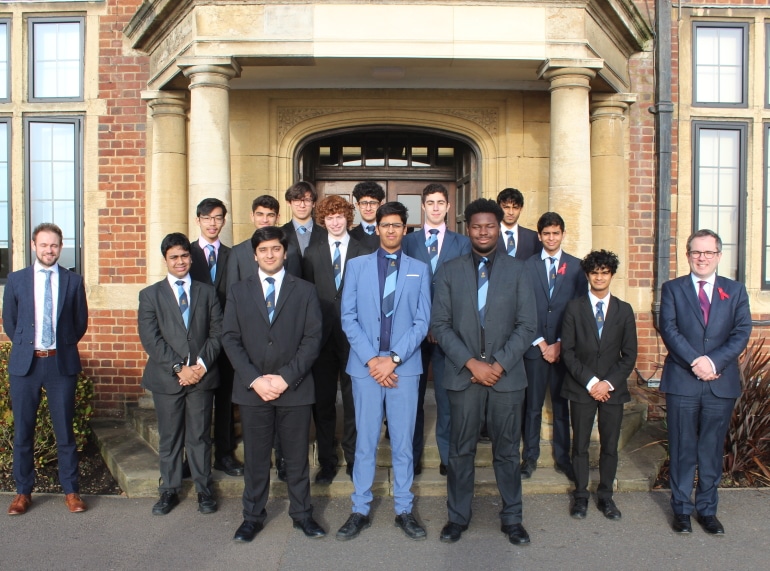
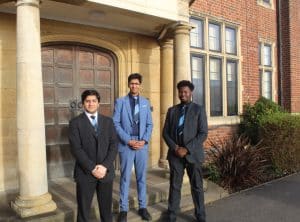 Siddhant will be working closely with the new Senior Vice-Captains, Sultan Khokhar and Paul Ofordu.
Siddhant will be working closely with the new Senior Vice-Captains, Sultan Khokhar and Paul Ofordu.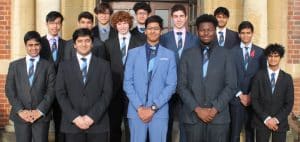 “The range of exceptional qualities within this diverse team is particularly striking. There are students: who have shown dynamic and imaginative leadership of a variety of in-school clubs and activities; who have demonstrated outstanding leadership qualities on the sports field, or within their form groups; who have enriched their peers’ experiences of School through their superlative contributions to peer-mentoring or music; and who have stood out in the way that they have embodied the School’s values in the way they treat other pupils – those who have always shown kindness, sensitivity, patience and generosity of spirit towards others. In their different ways, all of them have the qualities to set the tone for and to lead the student body as a whole to the very highest national, indeed international, standards.”
“The range of exceptional qualities within this diverse team is particularly striking. There are students: who have shown dynamic and imaginative leadership of a variety of in-school clubs and activities; who have demonstrated outstanding leadership qualities on the sports field, or within their form groups; who have enriched their peers’ experiences of School through their superlative contributions to peer-mentoring or music; and who have stood out in the way that they have embodied the School’s values in the way they treat other pupils – those who have always shown kindness, sensitivity, patience and generosity of spirit towards others. In their different ways, all of them have the qualities to set the tone for and to lead the student body as a whole to the very highest national, indeed international, standards.”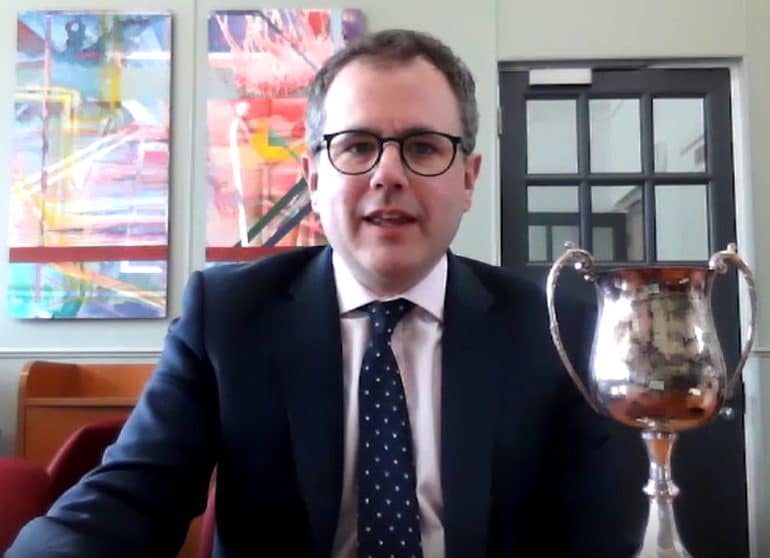
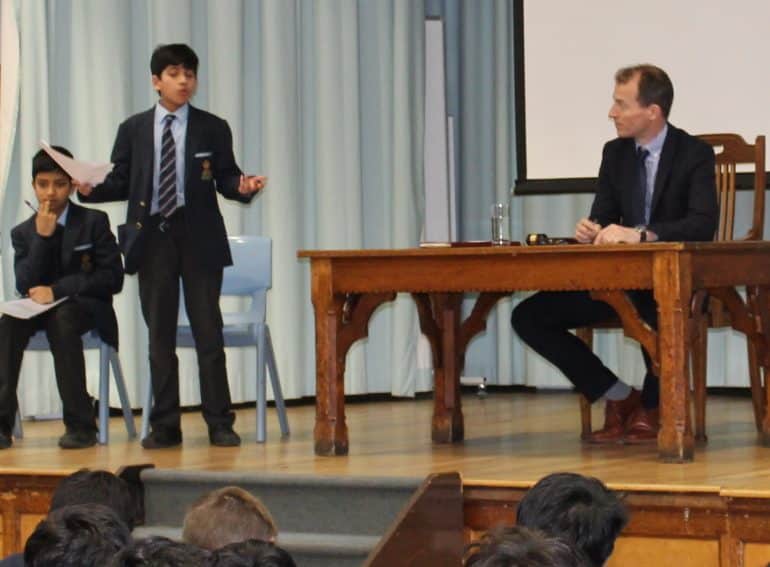
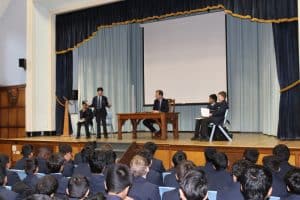 Broughton proposed the motion: This house believes that climate change is the biggest danger facing the modern world. The debate took place just before the current Coronavirus crisis erupted globally.
Broughton proposed the motion: This house believes that climate change is the biggest danger facing the modern world. The debate took place just before the current Coronavirus crisis erupted globally.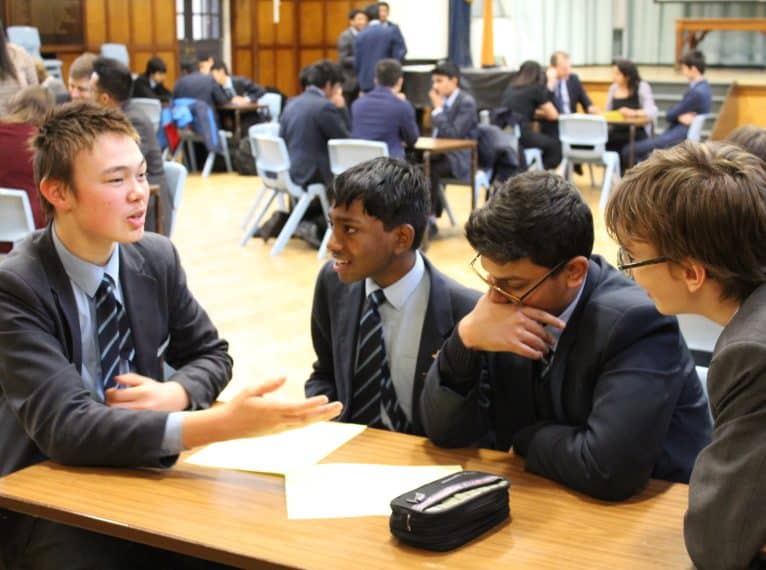
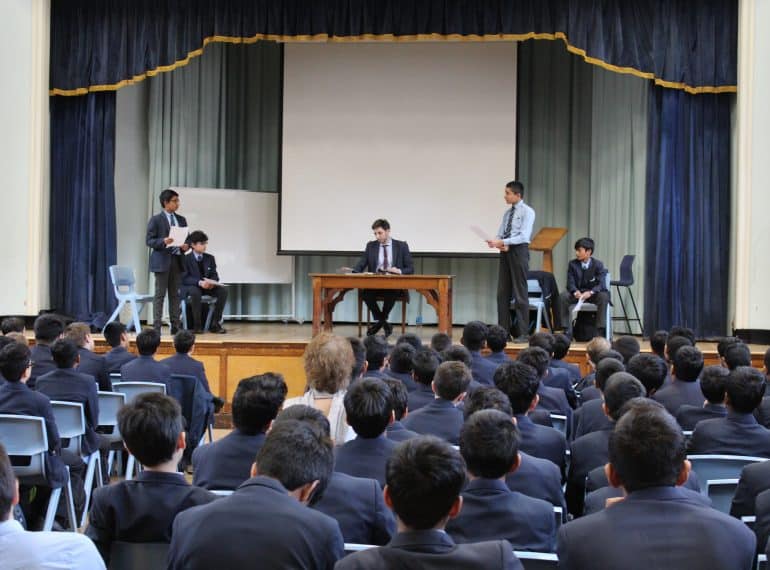
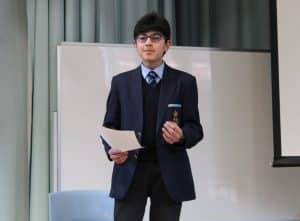 Zaki Mustafa, the first main speaker for Stapylton, presented the proposition in his allocated five minutes. He argued that freedom of speech is a pillar of democracy and a key human right, adding: “Democracy means that we decide how our country is run – the government is there to implement our decisions, not to make them.”
Zaki Mustafa, the first main speaker for Stapylton, presented the proposition in his allocated five minutes. He argued that freedom of speech is a pillar of democracy and a key human right, adding: “Democracy means that we decide how our country is run – the government is there to implement our decisions, not to make them.”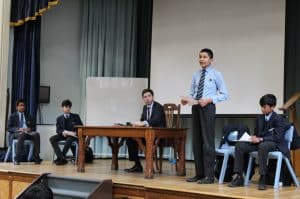 Ady added that censorship is needed in many key areas of society, including the internet, television, film and the media, and that, without censorship, children could search online for information about pornography and buying drugs. Democracy necessarily “includes censorship and we should use it to make the world a better place”, Ady concluded.
Ady added that censorship is needed in many key areas of society, including the internet, television, film and the media, and that, without censorship, children could search online for information about pornography and buying drugs. Democracy necessarily “includes censorship and we should use it to make the world a better place”, Ady concluded.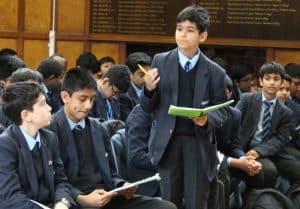 Three speakers from each side raised points or questions from the floor. For Stapylton, Joel Swedensky, Harrshiv Vyas and Akshat Bajaj touched on the importance of educating people with negative or hateful views rather than just silencing them. Leicester’s floor speakers, opposing the motion, were Abhay Halyal, Nikhil Mark and Pranav Haller, who cited as an example of the serious dangers of an absence of censorship the fact that terrorists can learn to make bombs online.
Three speakers from each side raised points or questions from the floor. For Stapylton, Joel Swedensky, Harrshiv Vyas and Akshat Bajaj touched on the importance of educating people with negative or hateful views rather than just silencing them. Leicester’s floor speakers, opposing the motion, were Abhay Halyal, Nikhil Mark and Pranav Haller, who cited as an example of the serious dangers of an absence of censorship the fact that terrorists can learn to make bombs online.